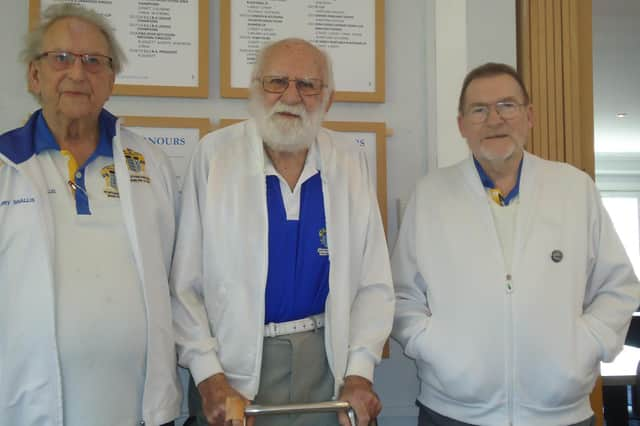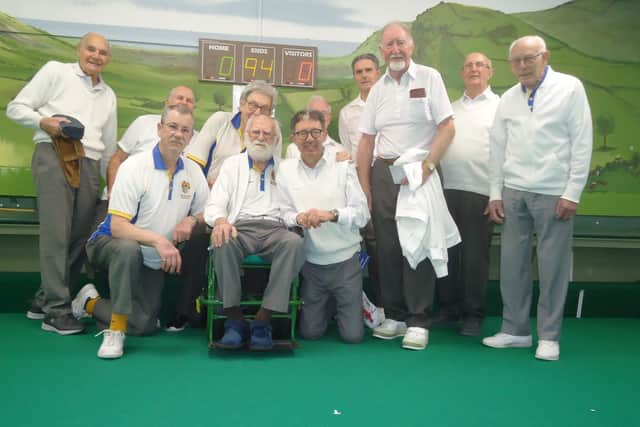From Brentford FC to bowls - all in a sporting life for 93-year-old who's still playing


The oldest player at Worthing Pavilion Bowling Club was born on November 28, 1928, to Thomas and Ethel Murray. They lived on the Great West Road, near Griffin Park, the home of Brentford FC, and John became a lifelong devotee of the Bees while he was still in short trousers.
Those formative years at Ealing Road School coincided with one of the greatest spells in the club's history.
Advertisement
Hide AdAdvertisement
Hide AdThe 1935-36 season, Brentford's first in the top flight of English football, was notable for their achievement in finishing higher than every other London club. They had won the Second Division title in May 1935 and John was in the thick of it, selling programmes inside Griffin Park before nearly every home game.


"It cost one penny, a single sheet of paper, folded in half, with the names of the players and a key to the old scoreboard so fans could learn what was happening in other matches," John explained. In the days before the internet and information overload, nearly every Football League ground had an old wood and iron scoreboard, with a capital letter visible in each slot. At half-time the letters were replaced by the scores, which were updated after the final whistle. But without a programme to disclose which letter corresponded to which match, a spectator would be left wondering who was beating whom 2-0.
John was paid eight old pennies (3.5p) for every hundred programmes he sold. So much has changed and so much remains the same since those thrilling days. When he went to Wembley last May to watch Brentford in the Championship play-off final, the 100-page full-colour programme cost £10. John was accompanied by his son, Alan, and one of his five grandchildren, Ollie .
John has also been to a Premier League match this season at Brentford's new stadium. "I wanted to see them there before I died," he says disarmingly, while showing no sign of disappearing any time soon.
Advertisement
Hide AdAdvertisement
Hide AdBack to John's schooldays. In 1938 Griffin Park, a ground renowned for having a pub only a long pass from each corner flag, was packed for Brentford's FA Cup quarter-final against Preston North End. The Bees had never been closer to the final and have never been closer since. They were only two wins from Wembley and what was, until European competitions took precedence, the biggest football match of the year. Sadly for John and nearly all the other 30,000 spectators, Preston beat Brentford and went on to lift the Cup a few weeks later.
The 1937-38 season was also notable for Brentford's league campaign. They topped the First Division table for 16 consecutive matches, until a winless run stretching from the end of January to late March scuppered their title challenge. "They had some wonderful players," John said. "Joe Crozier, he played in goal for Scotland [in wartime internationals]. I remember the Scots lost one game 8-0 and Joe got all the blame.
"The centre-forward was John Holliday. The full-backs were Bill Gorman and George Poyser."
John's father was a merchant navy captain whose regular voyage before the Second World War was from London to Brussels, taking horsemeat to the Belgians. John would accompany him during school holidays and remembers the journey down the Flushing Canal, navigating countless lock gates. "The ship would return home on the Monday, unload the cargo from Belgium, load the horsemeat on Tuesday and take it to the Brussels market."
Advertisement
Hide AdAdvertisement
Hide AdSeafaring ran in the family. John's uncle John was also a captain in the merchant navy and the boy's grandfather Francis was in command of sailing ships making the arduous voyage to Australia.
The outbreak of war put paid to John's jaunts across the North Sea, although his father continued with what became a dangerous mission. His ship was fitted with a 12lb gun at the rear, not much protection against Luftwaffe fighter bombers. One day they were steaming down the canal when two enemy aircraft approached. The Royal Navy gunner seconded to the merchant vessel fired one shell, which took the wing off the first aircraft and smashed into the second, destroying it. When John's father reached Brussels the crew were ordered to scuttle the ship to prevent it falling under German control.
John's uncle was less fortunate. While captaining a merchant vessel loaded with ammunition he realised a U-boat was on his tail, despite having zig-zagged to avoid detection. A torpedo slammed into the ship's hull and there were no survivors. The U-boat would also have been in peril if it had not dived beneath the surface immediately after firing its lethal weapon, such was the power of the explosion.
With Luftwaffe raids on London causing havoc, John was evacuated to High Wycombe in Buckinghamshire and spent two years at school there before returning to west London. "I was never any good at school. The science teacher, Mr Finch, would ask me to recite Archimedes' Principle. I could never remember it, so was told to write it out 100 times. That happened on many occasions." Strangely, ask John now and he trots it out as if he were answering a question on University Challenge. Eureka!
Advertisement
Hide AdAdvertisement
Hide Ad"I was sports mad; football, athletics, fives. I had a trial at Brentford but the centre-half took me out with a heavy tackle in the first minute and I thought, "This isn't for me'."
His secondary school in Chiswick lost the use of its main hall when furniture from bombed-out houses was stored there. That seemed a good idea until the day it copped a direct hit in an air raid.
After taking his school leaving exams in an air raid shelter, John started work for a firm of builders on the Great West Road called E H Burgess, later moving to their central London section. "They had an office at Buckingham Gate and I used to say, 'I'm a neighbour of the King'. I had a seat near the window and could watch the band approaching the palace for the Changing of the Guard each day."
By then John was studying accountancy at evening classes, which was where he met Diane, the love of his life. "We were married for 65 years, so we must have done something right." Their son runs a toolmaking business at Bognor Regis and their daughter, Gillian, is a former sergeant in the Metropolitan Police. She inherited her father's enthusiasm for sport, becoming a police swimming champion.
Advertisement
Hide AdAdvertisement
Hide AdTwo of his five grandchildren went to school in High Wycombe and they were amazed when John asked them if there was a fives court in the town. They didn't know he had played there as an evacuee.
Soon after their wedding, John and Diane decided a mutual hobby would be a good idea and they started to learn woodwork together. "Diane was very proud of a magazine rack she made but, unbeknown to me, she left it in the garage and I drove over it. She was not best pleased."
By then they were living in Isleworth, near Twickenham, and John recalls hearing the roar of the crowd carrying to his back garden, though he has never been to the home of English rugby. "I played football at Old Deer Park, next to one of the rugby grounds at Richmond. I was a member of Wyke Green Golf Club for many years and got my handicap down to seven." He also won the club's snooker championship.
John's passion for sport prompted him to become one of the first members of Richmond Nomads, a club set up soon after the war. They played football in winter and cricket in summer, though the latter became the principal activity within a few years.
Advertisement
Hide AdAdvertisement
Hide AdMore than 30 years ago John and Diane set up home at Ham Manor, just west of Worthing. He now lives in Broadwater and several times a week travels to the Pavilion Bowling Club where, despite poor eyesight, he enjoys competing in the spoon drives.
The club also hosts a monthly cribbage evening, at which anyone foolish enough to underestimate John's ability at the card table quickly realises their mistake. Now well into his 94th year, John Murray is aiming for a sporting century on and off the bowls rinks.